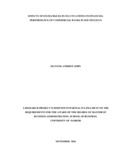| dc.contributor.author | Manyok, Andrew J | |
| dc.date.accessioned | 2017-01-06T08:35:41Z | |
| dc.date.available | 2017-01-06T08:35:41Z | |
| dc.date.issued | 2016 | |
| dc.identifier.uri | http://hdl.handle.net/11295/99547 | |
| dc.description.abstract | In an international trade involve different currencies; the variability of foreign exchange rates is a potentially interesting factor that drives the level of profitability of commercial banks as it affects their financial intermediation process. Fluctuations in exchange rate may be a source of risk to an organization. Huge losses in foreign exchanges may result to organizations failures in addition to instigating enormous burdens on profitability of an organization. Exchange rate variations in South Sudan have been characterized with periods of rapid depreciation of the domestic currency Sudanese pounds. The study aimed at investigating the effects of exchange rate fluctuations on financial performance of financial institutions in South Sudan. The study reviewed theoretical and empirical studies on exchange rate and financial performance. The study adopted a descriptive survey. Target focused on all financial institutions operating in South Sudan. Secondary data was collected from the banks’ consolidated financial statements as well as Central Bank of South Sudan. The study carried out the measures of central tendency as descriptive statistics to describe the data. The study adopted correlation analysis to explain the association between ROA, inflation rates, interest rates spread, bank size and exchange rates. A multiple linear regression model was employed. Return on assets was the dependent variables and exchange fluctuations variables as the independent variables. The study found that exchange rate fluctuations and financial performance had a weak negative association. Additionally, the South Sudan Pounds exchange rate against the United States Dollar was observed to be really high. The study concluded that the inflation rates have been increasing yearly over the entire study period. The relationship however between inflation and returns on assets was negative and hence it negatively impacted performance. The study concluded that interest rates especially lending rates have been increasing over time whereas the same observation was not eminent in deposit rates by banks. The study therefore concludes that the interest rates spread has been increasing in the recent years since borrowing had become expensive thus profitable whereas deposits rates were very small. The study recommended relevant authorities for instance. The Central Bank of South Sudan should adequately put measures to safeguard the value of the domestic currency. This would ensure that the value on the same does not fluctuate much day in day out. | en_US |
| dc.language.iso | en | en_US |
| dc.publisher | University of Nairobi | en_US |
| dc.rights | Attribution-NonCommercial-NoDerivs 3.0 United States | * |
| dc.rights.uri | http://creativecommons.org/licenses/by-nc-nd/3.0/us/ | * |
| dc.title | Effects of Exchange Rate Fluctuations on Financial Performance of Commercial Banks in South Sudan | en_US |
| dc.type | Thesis | en_US |



